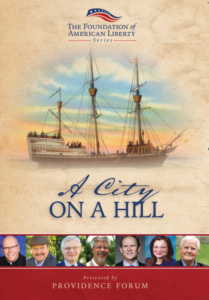“Christian Origins of Constitutional Democracy and Liberty”

| None | Light | Moderate | Heavy | |
|---|---|---|---|---|
| Language | ||||
| Violence | ||||
| Sex | ||||
| Nudity |
What You Need To Know:
CITY ON A HILL is an extremely informative, inspiring historical survey of the first 140 years or so of the American colonies. It reveals the major role their biblical heritage played on the formation of constitutional democracy, order and liberty in the United States. CITY ON A HILL has some historical references to persecution, torture and violence, but they are very light. Ideas such as self-governance, freedom of conscience, due process, and rule by the people and for the people; were all awakened during the time of the Puritans.
Content:
Very strong Christian, biblical, patriotic, pro-American worldview, with a strong opposition to government tyranny and ideologies such as communism and fascism, focuses on biblical principles that laid the foundation for the forming of the United States, many of the key characters are either clergymen or sons of clergymen and the way biblical truth guided them is evident;
No foul language;
Citations about violence, torture, a king’s beheading, and war, which include some black and white wood carvings, but no action sequences;
No sex;
No nudity;
No alcohol use;
No smoking or drugs; and,
Nothing else objectionable.
More Detail:
The documentary begins in 1630 off the shores of Massachusetts Bay at what was named Plymouth Rock near modern-day Boston, with Puritans readying to step foot onto the New World. As they waited aboard their ships, ready to land ashore, their leader John Winthrop took time to pause and dedicate the moment to God with a sermon titled, “A Model of Christian Charity.” Winthrop’s prioritization of God first establishes the theme of godly virtue throughout the documentary. His famous sermon is what inspired Ronald Reagan in his final radio program as President to say that America should be a city on a hill, a light unto the nations.
As the documentary unfolds, it jumps back to the reason why the Puritans departed from their homeland, to escape persecution from the King of England and the Church of England. It began in what was called The Gunpowder Plot of 1605 where a conspiracy to assassinate the English Parliament and monarchy hatched by Robert Catesby out of response to King James I’s persecution of Roman Catholics in England. The scheme was unsuccessful, but it did heighten religious intolerance throughout Great Britain.
This failed attempt led to much greater persecution of not only Catholics but all who departed from the Church of England’s state driven dogma. This included Separatists, the Pilgrims, Puritans, and Quakers.
The episode jumps to brief narrations of medieval torture to help illustrate the desperate plight of the Puritans and their need for refuge. Thus, the early founding principle of “freedom of conscience,” which is now universal amongst Western society, was established. The Puritans were religious non-conformists, and they cherished the biblical principle of covenant, “an agreement for self-government under God.” As a younger man at Cambridge, Puritan leader John Winthrop made a covenant with his people “to God first and then to each other.” It was not a desire to be free for freedom’s sake but rather to be free so that people may live as they ought, how their conscience dictated.
The episode then fasts forwards back to Massachusetts Bay to show how this concept of covenant and oaths help establish security in an early and fragile period. One of the most important documents was the 1641 Massachusetts Body of Liberty, which listed such civil rights as freedom of speech, the right to due process, the right to a trial by jury, and a right against double jeopardy.
This adherence to rights provided much needed protection, it went against the moral conscience of those who felt oaths of fealty (to God and their fellow man) was an unbiblical precedent. Among those who bumped heads against the strict interpretation of vows was the staunch biblical teacher Roger Williams. His ardent disagreement with Winthrop’s depiction of covenantalism led Williams to establish the more libertarian colony of Providence Plantation (known later as Rhode Island). The colony became a refuge for non-conformists persecuted for conscience’s sake. Williams believed that a man’s conscience before God comes before one’s obedience to civil authority. Historian Paul Johnson wrote, “If Winthrop was the greatest man of the Puritans, Roger Williams was the second greatest.”
With every new sprouting colony, a radical bottom-up system of government was established. In fact, the basic principle of electing leaders (whether church or government) is based on the Puritans’ Calvinist view of election. They would only vote for their pastors or magistrates if they resembled the Christian character of someone who was elect by God. The documentary discusses the founding of the colonies of Connecticut, Maryland, the Carolinas, and Georgia. According to their colonial charters, all of them existed for the sole purpose to “build the kingdom of their Lord Jesus.” The charter of Carolina, written by philosopher John Locke, instructs the settlers to: 1) live a Godly and moral life; 2) be kind to their neighbor Indians; and, 3) be open to other opinions. This liberal approach to settlement created a haven for Catholics, Jews and “heathens” living side by side.
The last colony discussed in CITY ON A HILL is Will Penn’s Sylvania (the Latin word for Forest), or Pennsylvania. This colony, gifted to William Penn by King Charles II, proved to be a refuge for Quakers whose piety made the Puritans seem nominal. Whether it was his unusual (by Puritan standards) faith or the persecution he faced in England, William Penn wanted to establish a haven for radicals. A place where people were governed by laws of their own making. In the charter he co-authored it states, “that no man has the authority to hinder his fellow man when it comes to personal convictions.” This regard for personal liberty allowed people of other faiths, including Jews and Indians, to live peaceably alongside their Quaker neighbors. As Penn once wrote, “Liberty without obedience is confusion and obedience without Liberty is slavery.”
CITY ON A HILL clarifies some of the controversial events in Puritan history.
Among these controversial events are King Phillip’s War, the Salem Witchcraft trials and slavery in Virginia. While leftist academics lay the blame entirely on white settlers, they conveniently leave out much needed context. For example, not many people know that, prior to King Phillip’ War in New England, there were 50 years of peace between whites and the American Indians. Also, it was a clergyman, Increase Mather, who ended the Salem Witch Trials by bringing the Puritans in Salem back to their biblical principles in the Book of Deuteronomy demanding two witnesses. Finally, CITY ON A HILL dives briefly into the origins of slavery and how people from all around the world, of all ethnicities, were at one time slaves. These historical contexts are illuminating and, albeit brief, help clarify controversial events in early colonial life.
While the information and historical facts in CITY ON A HILL are high quality, the story structure and voice recordings need some work. If the goal is to reach a wider and younger audience, improving the movie’s entertainment quality would help. Some historical re-enactments would help.
CITY ON A HILL documents the principles that guided the Puritans and seeks to explain where the well accepted ideal of “self-governance” was first established. It expounds upon many key figures during this time such as John Winthrop, Roger Williams, William Penn, and many minor characters in an uplifting, Christ-centered way. The movie champions biblical virtues and reveals the Christian, biblical foundations of America’s current system of a constitutional republic.
CITY ON A HILL is rich with historical, political, philosophical, and theological facts and quotes. It consistently refers to faith, providence and recognizes biblical truths in every critical decision made by the early colonial leaders. Also, key events take place with church and clergy approval. CITY ON A HILL has some historical references to persecution, torture and violence, but they are very light. You can watch the documentary here, at https://media.reallifenetwork.com/watch/channel/culture-and-current-events/series/61z5DSqAutfj-foundations-of-liberty/episode/140-h3kpz2buff8a-a-city-on-a-hill.
Historical Sources: “The Annals of America,” Encyclopedia Brittanica, 1976; George Bancroft’s “The History of the United States,” 1888; Paul Johnson, “The History of the American People,” 1997; Cotton Mather’s “The Great Works of Christ in America,” 1702; William J. Federer, “America’s God and Country,” 2000; William Bradford’s “A Plymouth Plantation,” 1651.


 - Content:
- Content: 

